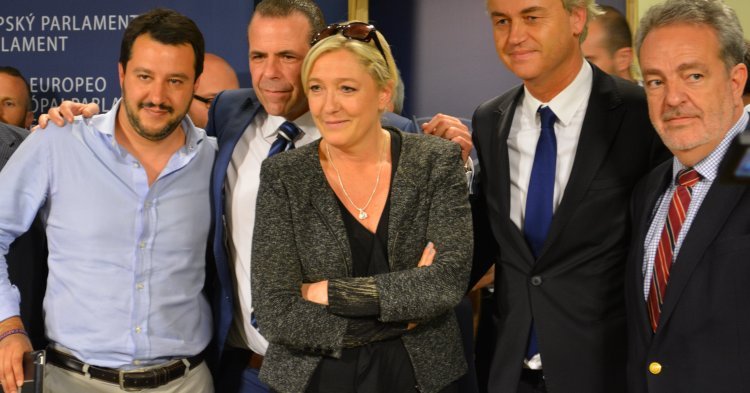One thing that has often astounded me in debates about Rule of Law and democratic backsliding is how much of the focus is centered on Central and Eastern Europe and how few of it, when any, is put on Western Europe.
This lack of attention to the instances in which Civil Liberties are jeopardised in Western European nation-states often generates a distorted portrait of our continent. In this fantasised outlook,Western Europe is pictured as a stronghold of healthy democratic tradition, while the so-called ‘New Europe’ east of the long-gone Iron Curtain is nothing but a nest of authoritarianism and ultra-conservatism.
To a certain extent, this is true - although some countries in the former Soviet sphere are still examples of healthy democracies (like Estonia’s 85% Democracy rating in Freedom House’s 2020 Nations in Transit report). But we should not forget that democratic backsliding can happen anywhere and start with the smallest of measures. Even Hungary’s Prime Minister Viktor Orbán was once seen as the bright young hope of Hungarian liberal democracy and the country has now fallen into a democratic breakdown under his leadership.
This article will then attempt to go beyond the distorted picture one may have on the differing state of democracy between Eastern and Western Europe. It will provide some insight from three Western EU member states where respect of fundamental rights is under jeopardy.
France: repression of migrant assistance and police brutality
France has been experiencing an important problem of structural police brutality. This issue is so deeply rooted into French state structures that in 2018, President Emmanuel Macron’s security chief, Alexandre Benalla, was caught beating demonstrators on the 1st of May parade in Paris, causing massive uproar.
That episode, whilst significant, is not an isolated one. Police violence has been increasingly rampant in the country. On last year’s Women’s Day, police officers used tear gas on groups of demonstrators with physical violence being exercised on them. Last November, police forces dismantled an Afghan refugee camp in Paris’ Place de la République using tear gas.
In recent years, several people have even been prosecuted in France for matters such as helping migrants in distress or denouncing police brutality. In 2018, a group of residents in the Alps were convicted after helping a group of migrants get across the border in light of harassment by far right activists. And that same year, a Human Rights activist, was prosecuted after he filmed policemen brutalising a group of migrants and volunteers in Calais.
Far from tackling these issues, the French government has been working on a security law with has been criticised by the UN due to some of its provisions clashing with Human Rights. One of the most concerning elements is the prohibition to publish images featuring abuses by police officers and the implementation of massive video surveillance.
Spain: freedom of speech under siege
Since the 2010s, judicial authorities and police forces in Spain have put freedom of speech under pressure. During the past decade, authorities have often used antiterrorist laws to prosecute social media users and artists under on the pretext of “promoting terrorism” and “humiliating victims of terrorism”. In 2017, a 21-year-old Twitter user was sentenced to one year in prison following a series of jokes she posted on the social network about the 1973 murder of Admiral Carrero Blanco, the second most senior official in General Francisco Franco’s dictatorship. In 2016, a couple of puppeteers underwent a lengthy trial for a play they performed in a park in Madrid and which featured references to the Basque terrorist group ETA.
However, unlike the previous examples, not all terrorism-related prosecutions have ended in dismissals. Last month, rapper Pablo Hasel was imprisoned following a nine-month sentence for one of his songs and a series of opinions posted on Twitter. This was not the first time a rapper was sentenced to prison. In 2018, Valtònyc (Josep Miquel Arenas) managed to flee his native Mallorca for in Brussels after being sentenced to three years and a half in prison for his lyrics featuring criticism over the Spanish monarchy and systematic political corruption.
These instances of prosecution and imprisonment fit in with a broader picture of repression of free speech, following legislation such as the 2015 Law for Citizens’ Security, also known as the “gag law” which has criminalised the organisation of demonstrations in front of public institutions without previous authorisation and severely fined the publishing of photographs of police agents. This law has been extensively used during the COVID 19 crisis for lockdown enforcement and led to more than 600,000 fines during the March-April 2020 period only.
Italy: criminalisation of migrant rescue and increase in violence against migrants
Since the height of the migrant crisis in 2015-2016 and the massive arrival of migrants into the Italian coasts, the country’s authorities have been increasingly keen on prosecuting and repressing those individuals and the organisations involved in rescue operations at sea.
Only last year, the crew of rescue ship Iuventa faced a twenty-year prison sentence for their assistance and rescue of more than 14,000 migrants stranded at sea, under charges of complicity with smuggler networks. The crew of the Iuventa has not been the only one as the crews of Vos Hestia and Vos Prudence are also currently facing similar charges.
In addition to persecuting sea rescue operations, Italy has also seen a surge in violence against migrants, a trend that mostly occurred during Matteo Salvini’s tenure as Interior Minister. In 2018, a series of attacks and murders were registered in the country, targeting migrants but also members of minorities such as Roma people.
These ‘case studies’ are not an extensive list of all the flaws that plague democracies and endanger fundamental rights in Western Europe. We could speak for length on how the charge of ‘insulting religious feelings’ is used to criminalise social movements in Spain, about abortion being completely illegal in Malta, or even about the generalised lack of resources allocated to the judiciary in many countries. All these examples are likely not a comprehensive list of all the flaws which plague Western European democracies nowadays, but they can hopefully make us reflect on the myth of Western Europe being the knight in shining armour invariably protecting democracy and civil liberties.


Follow the comments: |
|
